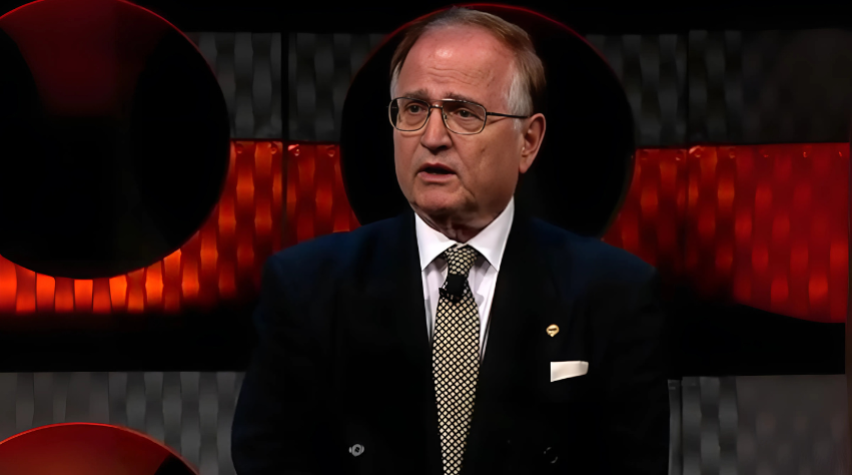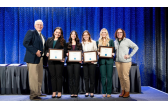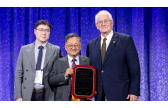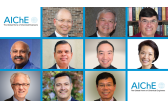
This post is authored by the Awards Selection Committee.
AIChE’s Regenerative Engineering Society (RES) has chosen Nicholas A. Peppas as the recipient of its Cato T. Laurencin Regenerative Engineering Society Founder’s Award for 2025. Peppas holds multiple prestigious positions at The University of Texas at Austin, including the Cockrell Family Regents Chair in Engineering, Professorships in Chemical and Biomedical Engineering, and the Pediatrics and Surgery Departments of the Dell Medical School, and Director of the Institute for Biomaterials, Drug Delivery, and Regenerative Medicine.
First presented in 2023, the award honors the founder of the RE Society and pioneer of the field of Regenerative Engineering, Professor Sir Cato T. Laurencin, M.D., Ph.D., K.C.S.L., and recognizes individuals for leadership in the science and practice of convergence research as applied to regenerative engineering and medicine. Dr. Laurencin has produced pioneering technologies for musculoskeletal repair and regeneration, leveraging cutting-edge expertise in polymeric materials science and engineering. He has pioneered work using polymeric biomaterials for treating musculoskeletal disorders, with work spanning fundamental research on polymeric materials to clinical trials and therapeutic applications.
Professor Peppas is slated to receive the prize on Monday evening, November 3rd, at the 2025 AIChE Annual Meeting in Boston, MA. Subsequently, Professor Peppas will deliver a lecture on new directions in regenerative engineering and bionanotechnology, focusing on the design of intelligent biomaterials that mimic biological systems to enable advanced therapeutic delivery, organ regeneration, and tissue regeneration.
Dr. Peppas’ recognition
Over five decades, Professor Peppas’ innovations in biomaterials, drug delivery, and bionanotechnology have helped shape the field of biomedical engineering and have informed the emerging field of regenerative engineering.
Widely recognized as one of the world leaders in modern drug delivery, he is known for his work in creating fundamental mathematical models for therapeutic agents' diffusion and transport through polymer carriers.
His pioneering work on biologically responsive polymers has led to hydrogels and bioadhesive systems that enable precise, controlled therapeutic release. He also engineered bioinspired materials that guide tissue regeneration across multiple tissues. His innovations have resulted in commercial products and companies, bridging engineering, medicine, and industry.
Professor Peppas is a member of the National Academy of Engineering, the National Academy of Medicine, the American Academy of Arts and Sciences, and 16 other academies in Canada, Mexico, China, South Korea, India, Greece, France, Spain, Romania, and others. In addition, he has received numerous prestigious awards, including AIChE’s Founders Award, the William Walker Award, the Warren K. Lewis Award, the J. Bailey Award, the Institute Lecture Award, the Biomedical Engineering Society’s Distinguished Scientist Award, the Pritzker Award, the prestigious Nanotechnology Kabiller Prize (2025), the Italian Giulio Natta Prize, the Acta Biomaterialia Gold Medal, the CMBE Shu Chien Achievement Award (2024), and the Ellis Island Gold Medal of Honor.
With over 2,250 published papers and more than 230,000 citations, Peppas has been named a Highly Cited Researcher by Thomson Reuters every year from 2014 to 2024. He has also served as president of the Society for Biomaterials, the Controlled Release Society, the International Union of Biomaterials for ten years, and the Sigma Xi.
After completing his undergraduate studies at NTU Athens, Greece, and doctorate in chemical engineering at the Massachusetts Institute of Technology (MIT, 1973), he became a professor at Purdue and, since 2002, at the University of Texas at Austin, mentoring over 130 Ph.D. students, 180 postdocs, and more than 1,000 researchers.
Peppas on regenerative engineering
To learn more about his perspectives on the field and the path that led to this honor, we spoke with Dr. Peppas about his achievements, inspirations, and advice for the next generation of regenerative engineers.
What does winning this award mean to you?
I am honored to be recognized for my work in the broad field of regenerative engineering on this, my 50th year of research. Regenerative engineering brings together cell and tissue engineering, biomaterials, cellular and molecular biology, and clinical science to restore or replace the function of cells, tissues, or organs, or to prevent their degeneration.
What excites you most about the field?
The most exciting aspect of the field is the ability to integrate all aspects of biomedical sciences into our research. The founder of the field, Dr. Cato Laurencin, had the brilliant idea of emphasizing its fundamentals and guiding it to a maturity that underscores its importance.
What advice would you give to someone starting a career in regenerative engineering?
Study the basics of the field and combine your knowledge of engineering, especially chemical engineering, with biology to solve important medical and biological problems. Make sure you translate that knowledge into groundbreaking solutions that improve patient treatment and quality of life. Above all, believe in yourself and what you can achieve.
Read more about Dr. Peppas and his contributions.
Peppas will be honored at the 2025 AIChE Annual Meeting, November 2–6 in Boston, Massachusetts.








